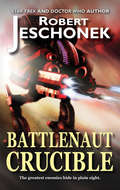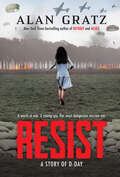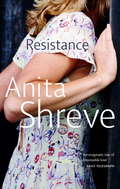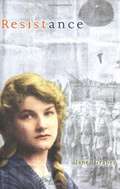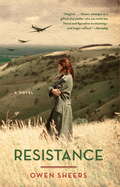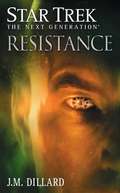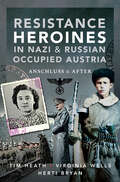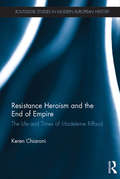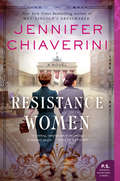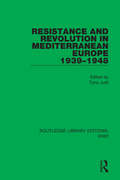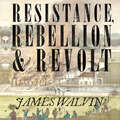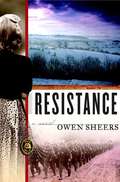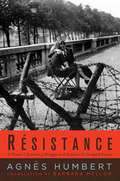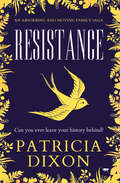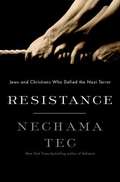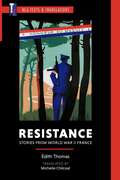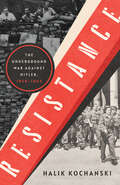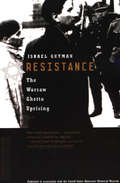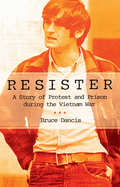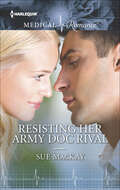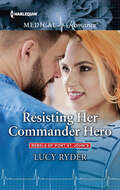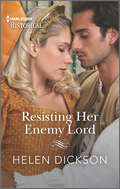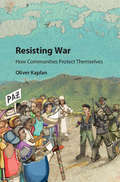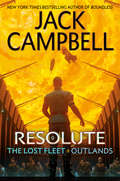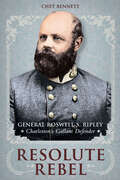- Table View
- List View
Resist the Red Battlenaut
by Robert T. Jeschonek Ben BaldwinThe Red Battlenauts show no mercy. Roaring out of the darkness of deep space, these ultra-high tech war machines pound the hell out of both sides in a bloody interstellar civil war. No one can even see the Reds--no one except Marine Corporal Solomon Scott. Recruited by the hardcore SEAL-like Diamondbacks, Scott becomes a secret weapon in the ultimate struggle for survival. In battle after battle on perilous alien worlds, Scott and the Diamondbacks fight back against the ruthless Reds, desperately holding the line in furious clashes of muscle and metal. But when a face from the past exposes the secrets behind the carnage, a quest for answers becomes a race against time. Because the masters of the Red Battlenauts have more on their minds than a thirst for conquest...and only Solomon Scott can hope to stand against them. In the galaxy's darkest hour, the highest stakes imaginable drive this hero in Battlenaut armor to seize his destiny. But can he overcome a soul-searing betrayal that strikes out of nowhere like the Reds themselves? Only by crushing the monsters of his own dark past can Scott vanquish the forces blasting humanity to the brink of annihilation.Don't miss this exciting sequel to Beware The Black Battlenaut by award-winning storyteller Robert T. Jeschonek, a master of hard-hitting science fiction that really packs a punch. Strap yourself into the cockpit for over 100,000 words of blistering all-new military SF action!Reviews"Jeschonek is a master of military mecha mayhem. Fast-paced, pulse-pounding combat scenes make Resist the Red Battlenaut a must-read in his growing Battlenaut series." - William H. Keith, author of the Grey Death Battlemech novels"Robert Jeschonek is a towering talent..." - Mike Resnick, Hugo and Nebula Award-winning author"Robert Jeschonek is the literary love child of Tim Burton and Neil Gaiman..." - Adrian Phoenix, critically acclaimed author of The Maker's Song series and Black Dust Mambo
Resist: A Story of D-Day
by Alan GratzFrom Alan Gratz, bestselling author of Refugee and Allies, comes an original novella--in ebook!In Allies, Alan Gratz's thrilling novel of D-Day, we met Samira, a young girl who is part of the underground French resistance during World War II. Samira cracks codes and trades secrets in order to sabotage the Nazis' plans.In Resist, we delve deeper into Samira's story. Here, we follow Samira as she journeys through the Nazi-occupied French countryside, on a daring rescue mission to find her captured mother. Accompanied only by a loyal dog named Cyrano, Samira must rely on her courage and wits to avoid and outsmart the German forces. But it's D-Day, and with the Allied forces landing in Europe, fierce battles are raging all around. Can Samira reach her mother and save her in time?This action-packed World War II short story can be read before or after Allies--or entirely on its own!
Resistance
by Anita ShreveAs the wife of a Resistance member in German-occupied Belgium, Claire Daussois has grown used to hiding strange men in her attic. By the end of 1943, the tiny room has housed dozens of Allied airmen, soldiers and other refugees, whom Claire nurses and harbours from the perpetual threat of discovery by the Gestapo.The B-17 bomber that crash-lands outside Claire's village of Delahaut contains the man who will be both the last and the most significant of the attic's residents: US Air Force pilot Ted Brice. Ted is found severely wounded and semi-conscious by ten-year-old Jean Benoit minutes before the Germans begin their search for survivors. Knowing of Claire's connections with the Resistance, and desperate to atone for his father's shameful collaboration, Jean realises that Claire is the pilot's only hope of survival.The month that follows will stay with them both for the rest of their lives. A few weeks only, a handful of days, it is a period in which the war recedes in the face of more powerful forces - before imposing itself once more with shocking suddenness.
Resistance
by Janet GraberIt is 1942, and German troops have invaded France. Marianne's mother has joined the Resistance, and Marianne disapproves. Her father has already been killed in the fighting--must her mother risk their lives as well? When her mother hides a wounded English soldier in the cellar of their woodshed, Marianne is filled with dread. She struggles between the impulse to give up the soldier and save her family, and the desire to help her country fight the occupying army.
Resistance
by Owen SheersResistance is a beautifully written and powerful story set during an imagined occupation of Britain by Nazi Germany in World War II. In a remote and rugged Welsh valley in 1944, in the wake of a German invasion, all the men have disappeared overnight, apparently to join the underground resistance. Their abandoned wives, a tiny group of farm women, are soon trapped in the valley by an unusually harsh winter--along with a handful of war-weary German soldiers on a secret mission. The need to survive drives the soldiers and the women into uneasy relationships that test both their personal and national loyalties. But when the snow finally melts, bringing them back into contact with the war that has been raging beyond their mountains, they must face the dramatic consequences of their choices.From the Trade Paperback edition.t as the pressure of the war beyond presses in on this isolated community, this fragile state of harmony is increasingly threatened.Imbued with immense imaginative breadth and confidence, Owen Sheers's debut novel unfolds with the pace and intensity of a thriller. A hymn to the glorious landscape of the Welsh border territories and a portrait of a community under siege, Resistance is a first novel of grace and power.
Resistance (Star Trek: The Next Generation)
by J.M. DillardAn electrifying thriller starring Captain Jean-Luc Picard set in the Star Trek: The Next Generation universe.Captain Jean-Luc Picard, his ship repaired, must now reassemble his crew. With the departure of both William Riker and ship's counsellor Deannna Troi, the captain must replace his two most trusted advisors. He chooses a Vulcan, a logical choice, and for his new first officer, Worf. But the Klingon refuses the promotion and the new ship's counsellor appears to actively dislike Worf. A simple shake-down mission should settle everything. Except that once again, the captain hears the song of the Borg collective. Admiral Janeway is convinced that the Borg have been crushed and are no longer a threat. Picard believes she is wrong, and that if the Enterprise doesn't act the entire Federation will be under the domination of its most oppressive enemy.
Resistance Heroines in Nazi & Russian Occupied Austria: Anschluss & After
by Tim Heath Virginia Wells Herti BryanAustria's Anschluss - its 'annexation' - saw no gunfire, no bloodcurdling screams of Stukas overhead or the rumble of heavy artillery when German troops marched in on 12 March 1938. It was no ‘Blitzkrieg’ on the contrary, some Austrians even welcomed the ‘invaders’ and the opportunity to unite the ethnic German peoples under the rule of Austria’s most infamous son, Adolf Hitler. Austria’s wealth of natural and mineral resources were especially useful to support the Third Reich’s aggression in Europe. The Nazis were keen to exploit these assets and many Austrians benefited from increased employment. However, any initial euphoria was soon replaced by fear and anxiety as the brutal reality of the new regime became apparent. Here is the remarkable story of Herti Bryan who, as a young child, witnessed the totalitarian nightmare of Hitler’s dream for world domination. Standing up for what she believed to be right, Herti acted courageously to frustrate the occupying Nazis. In addition to Herti’s story, we learn of the experiences of Milly Keller and Hilde Schubert who shared contempt for the Nazi occupiers. The three girls vividly describe their different experiences during the war, although there is a striking similarity in the even greater terror they were subjected to under the Russian ‘liberators’. In this volume the lives of Herti, Milly and Hilde come together to reveal an astonishing picture of life in occupied Austria. Drawing on unimaginable fortitude, these girls defied domination and fought fearlessly, risking their own lives, to carry out their moral obligation to humanity. This is their story, in their own words and told for the first time.
Resistance Heroism and the End of Empire: The Life and Times of Madeleine Riffaud (Routledge Studies in Modern European History)
by Keren ChiaroniThis book introduces an English-speaking public to the life of Madeleine Riffaud – one of the last living leaders of the French Resistance. It considers the nature of the rebel hero in France’s founding historical narratives (revolution, insurrection, resistance) while asking what contributions such a hero might make to debates on national identity today. Through a series of narrative close-ups, the book offers perspectives on major chapters in nineteenth- and twentieth-century French history through the eyes of activists who experienced them: the Revolution of July 1830 and the 1851 insurrection against Napoleon, as experienced by Riffaud’s ancestor Edme Liron, and the French Resistance, the Vietnam War and French–Algerian conflict as experienced by Riffaud herself. The book aims to explore the kinds of choices individuals face when their beliefs set them at odds with the state, and to suggest that there is a place for individual action in a global arena where state boundaries are becoming increasingly less relevant.
Resistance Women: A Novel
by Jennifer ChiaveriniFrom the New York Times bestselling author of Mrs. Lincoln’s Dressmaker, an enthralling historical saga that recreates the danger, romance, and sacrifice of an era and brings to life one courageous, passionate American—Mildred Fish Harnack—and her circle of women friends who waged a clandestine battle against Hitler in Nazi Berlin.After Wisconsin graduate student Mildred Fish marries brilliant German economist Arvid Harnack, she accompanies him to his German homeland, where a promising future awaits. In the thriving intellectual culture of 1930s Berlin, the newlyweds create a rich new life filled with love, friendships, and rewarding work—but the rise of a malevolent new political faction inexorably changes their fate. As Adolf Hitler and his Nazi Party wield violence and lies to seize power, Mildred, Arvid, and their friends resolve to resist. Mildred gathers intelligence for her American contacts, including Martha Dodd, the vivacious and very modern daughter of the US ambassador. Her German friends, aspiring author Greta Kuckoff and literature student Sara Weitz, risk their lives to collect information from journalists, military officers, and officials within the highest levels of the Nazi regime. For years, Mildred’s network stealthily fights to bring down the Third Reich from within. But when Nazi radio operatives detect an errant Russian signal, the Harnack resistance cell is exposed, with fatal consequences. Inspired by actual events, Resistance Women is an enthralling, unforgettable story of ordinary people determined to resist the rise of evil, sacrificing their own lives and liberty to fight injustice and defend the oppressed.
Resistance and Revolution in Mediterranean Europe 1939–1948 (Routledge Library Editions: WW2 #27)
by Tony JudtThis book, first published in 1989, is the first general study of Communism in Mediterranean Europe during and immediately after the war. It sheds light on the origins of Europe’s Cold War East-West divide and probes the common and conflicting interests of the Soviet Union with the separate national and Communist resistance movements. It explores controversial issues including Stalin’s intentions in post-war diplomacy, Communist attitudes to Nazi collaboration in France, and the origins of the Cold War. The decade following the outbreak of the war saw the transformation of society through armed conflict, national resistance and political revolution. The relationship between resistance to Fascism and occupation, on the one hand, and profound social and political changes on the other, was especially marked in southern Europe. In France and Italy, Communist parties emerged as prominent participants in post-war governments; in Yugoslavia the Communist partisans seized full power and effected a social revolution; while a similar attempt in Greece led to a long and bitter civil war.
Resistance, Rebellion & Revolt: How Slavery Was Overthrown
by Professor James WalvinThis long overdue, vivid and wide-ranging examination of the significance of the resistance of the enslaved themselves - from sabotage and running away to outright violent rebellion - shines fresh light on the end of slavery in the Atlantic World. It is high time that this resistance, in addition to abolitionism and other factors, was given its due weight in seeking to understand the overthrow of slavery. Fundamentally, as Walvin shows so clearly, it was the implacable hatred of the enslaved for slavery and their strategies of resistance that made the whole system unsustainable and, ultimately, brought about its downfall. Walvin's approach is original, too, in looking at the Atlantic world as a whole, including the French and Spanish Empires and Brazil, as well as Britain's colonies. In doing so, he casts new light on one of the major shifts in Western history: in the three-hundred years following Columbus's landfall in the Americas, slavery had become a widespread and critical institution. It had seen twelve million Africans forced onto slave ships; a forced migration that had had seismic consequences for Africa. It had transformed the Americas and materially enriched the Western world. It had also been largely unquestioned - in Europe at least, and among slave owners, traders and those who profited from the system. Yet, within a mere seventy-five years during the nineteenth century, slavery had vanished from the Americas: it had declined, collapsed and been destroyed by a complexity of forces that, to this day, remains disputed. As Walvin shows so clearly here, though, it was in large part overthrown by those it had enslaved.
Resistance: A Novel
by Owen SheersIt's 1944 and Sarah Lewis and the women in Ochlon valley are left alone after all the local men disappear one night. The women's worlds suddenly shrink to the day-to-day struggles to keep their sheep farms going until the war comes to their doorsteps in the form of Capt. Albrecht Wolfram and his men, who have a murky mission to carry out in the valley. Promising to leave the women alone, the Germans occupy an abandoned house and the two camps keep mostly to themselves until a harsh winter takes hold, and it becomes clear that the locals and the Germans will have to depend on one another to survive. It's also revealed that Albrecht is just as interested as the locals are in staying away from the war for as long as possible, and the two communities begin to merge. But when the weather breaks and the valley reopens to the world-and hence the war-the peculiar idyll threatens to shatter.
Resistance: A Woman's Journal of Struggle and Defiance in Occupied France
by Agnès Humbert Barbara MellorAt the fall of Paris, Humbert verges on despondency until she hears de Gaulle's broadcast calling for all Frenchmen to carry on the struggle. Prompted to action, she begins networking, bringing together some of the key figures of the resistance, including Boris Vildé and Pierre Brossolette, with whose help she and others produce the underground liberation newspaper, "Résistance".
Resistance: An Absorbing and Moving Family Saga
by Patricia DixonA woman revisits the dark days of her youth in France during WWII in this novel of family bonds, the horrors of war, and the difficult path to healing.During a road trip to France with her granddaughter, Dottie Tanner remembers the traumatic events that transpired when she risked everything to fight for her country and freedom. Young Dottie parachuted into occupied territory to work with the Resistance, living each day homesick and terrified of capture by the Nazi regime. She had no idea that a threat lurked among her comrades—a traitor who would wreak havoc on her life.Sixty years later, the traitor is finally exposed, and Dottie’s whole world is turned upside down. Will her final mission be one of revenge? Or can she forgive and forget? Weaving between past and present, Resistance is an absorbing family saga about the pain we carry with us and the legacy we pass down to the future.
Resistance: Jews and Christians Who Defied the Nazi Terror
by Nechama TecIn Resistance, Tec draws on first-hand accounts, interviews, and other sources to reveal the full range of tactics employed to resist the Nazi regime in Poland. She compares Jewish and non-Jewish groups, showing that they faced vastly different conditions. The Jewish resistance had its own particular aims, especially the recovery of dignity and the salvation of lives. Tec explores the conditions necessary for resistance, including favorable topography, a supply of arms, and effective leadership, and dedicates the majority of the book to the stories of those who stood up and fought back in any way that they could.
Resistance: Stories from World War II France (Texts and Translations #34)
by Édith ThomasBased on real events of the French Resistance during World War II, Édith Thomas's stories explore how ordinary people respond to the extraordinary conditions of political occupation. The stories, first published under the title Contes d'Auxois (Auxois Stories) by an underground press in 1943, were written to oppose Vichy-Nazi propaganda and to offer encouragement to civilians who felt resigned to defeat.Whether lining up to wait for food, tuning in to a forbidden radio broadcast, adapting to living side by side with German soldiers, or preparing for an act of sabotage, the characters in these stories must make choices in highly compromised circumstances on a daily basis. As the characters confront their own suffering and that of others, their actions inspire readers to consider the nature of heroism, the idea that people can share a common humanity with their enemies, and the possibility for individuals to find solidarity in an overwhelming, isolating world.
Resistance: The Underground War Against Hitler, 1939-1945
by Halik Kochanski“This is the most comprehensive and best account of resistance I have read. It addresses the story with scholarly objectivity and an absolute lack of sentimentality. So much romantic twaddle is still published . . . it is marvelous to read a study of such breadth and depth, which reaches balanced judgments.” —Max Hastings, The Sunday Times (UK) Resistance is the first book of its kind: a monumental history that finally integrates the many resistance movements against Nazi hegemony in Europe into a single, sweeping narrative of defiance. “To resist, therefore. But how, when and where? There were no laws, no guidelines, no precedents to show the way . . .” —Dutch resister Herman Friedhoff In every country that fell to the Third Reich during the Second World War, from France in the west to parts of the Soviet Union in the east, a resistance movement against Nazi domination emerged. And every country that endured occupation created its own fiercely nationalist account of the role of homegrown resistance in its eventual liberation. Halik Kochanski’s panoramic, prodigiously researched work is a monumental achievement: the first book to strip these disparate national histories of myth and nostalgia and to integrate them into a definitive chronicle of the underground war against the Nazis. Bringing to light many powerful and often little-known stories, Resistance shows how small bands of individuals took actions that could lead not merely to their own deaths, but to the liquidation of their families and their entire communities. As Kochanski demonstrates, most who joined up were not supermen and superwomen, but ordinary people drawn from all walks of life who would not have been expected—least of all by themselves—to become heroes of any kind. Kochanski also covers the sheer variety of resistance activities, from the clandestine press, assistance to Allied servicemen evading capture, and the provision of intelligence to the Allies to the more violent manifestations of resistance through sabotage and armed insurrection. For many people, resistance was not an occupation or an identity, but an activity: a person would deliver a cache of stolen documents to armed partisans and then seamlessly return to their normal life. For Jews under Nazi rule, meanwhile, the stakes at every point were life and death; resistance was less about national restoration than about mere survival. Why resist at all? Who is the real enemy? What kind of future are we risking our lives for? These and other questions animated those who resisted. With penetrating insight, Kochanski reveals that the single quality that defined resistance across borders was resilience: despite the constant arrests and executions, resistance movements rebuilt themselves time and time again. A landmark history that will endure for decades to come, Resistance forces every reader to ask themselves yet another question, this distinct to our own times: “What would I have done?”
Resistance: The Warsaw Ghetto Uprising
by Israel GutmanThe &“exhilarating&” definitive account of the 1943 uprising in Poland&’s capital, named a Best Book of the Year by Publishers Weekly and the Jewish Observer (Los Angeles Times). No act of Jewish resistance during the Holocaust fired the imagination quite as much as the Warsaw Ghetto Uprising of April 1943. It was an event of epic proportions in which a group of relatively unarmed, untrained Jews managed to lead a military revolt against the Nazi war machine. In this riveting, authoritative history, a Holocaust scholar and survivor of the battle draws on diaries, letters, underground press reports, and his own personal experience to bring a landmark moment in Jewish history to life—offering &“a dramatic and memorable picture of the ghetto&” and showing how a vibrant culture shaped the young fighters whose defiance would have far-reaching implications for the Jewish people (Library Journal). &“Superb, moving, richly informative history.&” —Publishers Weekly Note: Some photos and maps contained in the print edition of this book have been excluded from the ebook edition.
Resister
by Bruce DancisBruce Dancis arrived at Cornell University in 1965 as a youth who was no stranger to political action. He grew up in a radical household and took part in the 1963 March on Washington as a fifteen-year-old. He became the first student at Cornell to defy the draft by tearing up his draft card and soon became a leader of the draft resistance movement. He also turned down a student deferment and refused induction into the armed services. He was the principal organizer of the first mass draft card burning during the Vietnam War, an activist in the Resistance (a nationwide organization against the draft), and a cofounder and president of the Cornell chapter of Students for a Democratic Society. Dancis spent nineteen months in federal prison in Ashland, Kentucky, for his actions against the draft. In Resister, Dancis not only gives readers an insider's account of the antiwar and student protest movements of the sixties but also provides a rare look at the prison experiences of Vietnam-era draft resisters. Intertwining memory, reflection, and history, Dancis offers an engaging firsthand account of some of the era s most iconic events, including the 1963 March on Washington for Jobs and Freedom, the Abbie Hoffman-led "hippie invasion" of the New York Stock Exchange, the antiwar confrontation at the Pentagon in 1967, and the dangerous controversy that erupted at Cornell in 1969 involving African American students, their SDS allies, and the administration and faculty. Along the way, Dancis also explores the relationship between the topical folk and rock music of the era and the political and cultural rebels who sought to change American society.
Resisting Her Army Doc Rival
by Sue MacKayTwo military doctors face past trauma and guilt in order to heal their broken hearts—and move into the future together . . . Flirting with danger! Infuriating, irresistible army doc Sam Lowe is the last person Madison Hunter wants to work with. He challenges her, and soon the only thing hotter than their rivalry is their growing chemistry! But Maddy hides scars that tell a heartbreaking story, and Sam has his own emotional wounds. He’s determined to take his heart with him when he leaves the army base, yet as he starts to see beneath Maddy’s tough exterior, it becomes more and more clear that his heart belongs with her . . .
Resisting Her Commander Hero: The Doctors' Baby Miracle / Resisting Her Commander Hero (rebels Of Port St. John's, Book 1000) (Rebels of Port St. John's)
by Lucy RyderFrankie doesn’t need a hero… But can she fight her attraction to Nate? Paramedic Frankie Bryce is finally over her crush on her late brother’s best friend, former navy SEAL Nate Oliver—but he returns to their hometown acting as if she’s still the wild child teenager he has to protect (he promised her brother he would!). Frankie’s all woman now, and definitely doesn’t need rescuing! Trouble is, this super-sexy hero is impossible to ignore…
Resisting Her Enemy Lord (Mills And Boon Historical Ser.)
by Helen DicksonA tumultuous journeyA tale of war, betrayal and passion…Despite her unhappy marriage, Catherine Stratton had defended her husband’s castle for six years while he was at war. Now widowed, she must travel with John, her late husband’s cousin, who’d fought on the opposing side. Facing danger at every turn, she’s stunned by the heat burning between them. Is this just lust, which will pass…or is this enemy lord a man she can trust with her life and her future?From Harlequin Historical: Your romantic escape to the past.
Resisting War
by Oliver KaplanIn civil conflicts around the world, unarmed civilians take enormous risks to protect themselves and confront heavily armed combatants. This is not just counterintuitive - it is extraordinary. In this book, Oliver Kaplan explores cases from Colombia, with extensions to Afghanistan, Pakistan, Syria, and the Philippines, to show how and why civilians influence armed actors and limit violence. Based on fieldwork and statistical analysis, the book explains how local social organization and cohesion enable both covert and overt nonviolent strategies, including avoidance, cultures of peace, dispute resolution, deception, protest, and negotiation. These 'autonomy' strategies help civilians retain their agency and avoid becoming helpless victims by limiting the inroads of armed groups.
Resolute (The Lost Fleet: Outlands #2)
by Jack CampbellA Nominee for the 2022 Dragon Award for Best Military Science Fiction or Fantasy Admiral John &“Black Jack&” Geary must battle dangers both within and without the Alliance, in this exciting continuation of the New York Times bestselling series.Geary knows that some political factions in the Alliance were just trying to get rid of him when he was assigned to escort a diplomatic and scientific mission to the far reaches of humanity&’s expansion into the galaxy . . . and beyond. But he views his mission as both a duty and an opportunity to make things better wherever he can. And when a crippled Rift Federation ship tumbles out of jump space, Geary leaps into action. But the survivors&’ story isn&’t completely adding up. As Geary investigates, he soon finds himself fending off spies and assassins while leading the fleet as it fights its way across space controlled by the mysterious and hostile aliens whom humans call enigmas. Challenges arrive at every turn, including an unknown alien species that invites the fleet to visit one of their star systems. With little information to go on, Geary must weigh the benefits of potential new allies against the possibility of a trap. The fate of the fleet—and perhaps even the future of humanity—will depend on him making the right decision. If he can stay alive long enough to do that.
Resolute Rebel: General Roswell S. Ripley, Charleston's Gallant Defender
by Chet BennettThe first biography of the general’s complex, often contradictory military service in the US and Confederate armies and his postwar British exploits.Roswell S. Ripley (1823–1887) was a man of considerable contradictions exemplified by his distinguished antebellum service in the US Army, followed by a controversial career as a Confederate general. After the war he was active as an engineer/entrepreneur in Great Britain. Author Chet Bennett contends that these contradictions drew negative appraisals of Ripley from historiographers, and in Resolute Rebel Bennett strives to paint a more balanced picture of the man and his career.Born in Ohio, Ripley graduated from the US Military Academy and served with his classmate Ulysses S. Grant in the Mexican War, during which Ripley was cited for gallantry in combat. In 1849 he published The History of the Mexican War, the first book-length history of the conflict. While stationed at Fort Moultrie in Charleston, Ripley met his Charleston-born wife and began his conversion from unionism to secessionism. After resigning his US Army commission in 1853, Ripley became a sales agent for firearms manufacturers. When South Carolina seceded from the Union, Ripley took a commission in the South Carolina Militia and was later commissioned a brigadier general in the Confederate army. Wounded at the Battle of Antietam in 1862, he carried a bullet in his neck until his death. Unreconciled in defeat, Ripley moved to London, where he unsuccessfully attempted to gain control of arms-manufacturing machinery made for the Confederacy, invented and secured British patents for cannons and artillery shells, and worked as a writer who served the Lost Cause.After twenty-five years researching Ripley in the United States and Great Britain, Bennett asserts that there are possibly two reasons a biography of Ripley has not previously been written. First, it was difficult to research the twenty years he spent in England after the war. Second, Ripley was so denigrated by South Carolina’s governor Francis Pickens and Gen. P. G. T. Beauregard that many writers may have assumed it was not worth the effort and expense. Bennett documents a great disconnect between those negative appraisals and the consummate, sincere military honors bestowed on Ripley by his subordinate officers and the people of Charleston after his death, even though he had been absent for more than twenty years.“A vitally useful addition to the Civil War Charleston literature.” —Civil War Books and Authors“[A] deeply researched and closely argued study. General Roswell S. Ripley emerges from the margins of Civil War history thanks to the able pen of Chet Bennett.” —A. Wilson Greene, author of Civil War Petersburg: Confederate City in the Crucible of War
